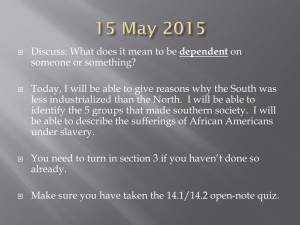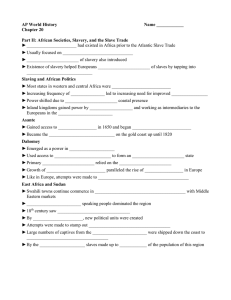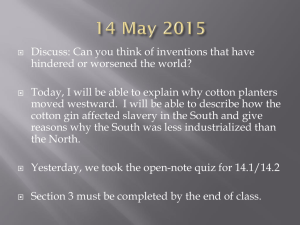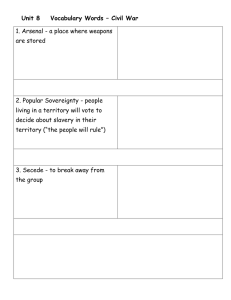Fall 2018 AP US History Final Exam Howard
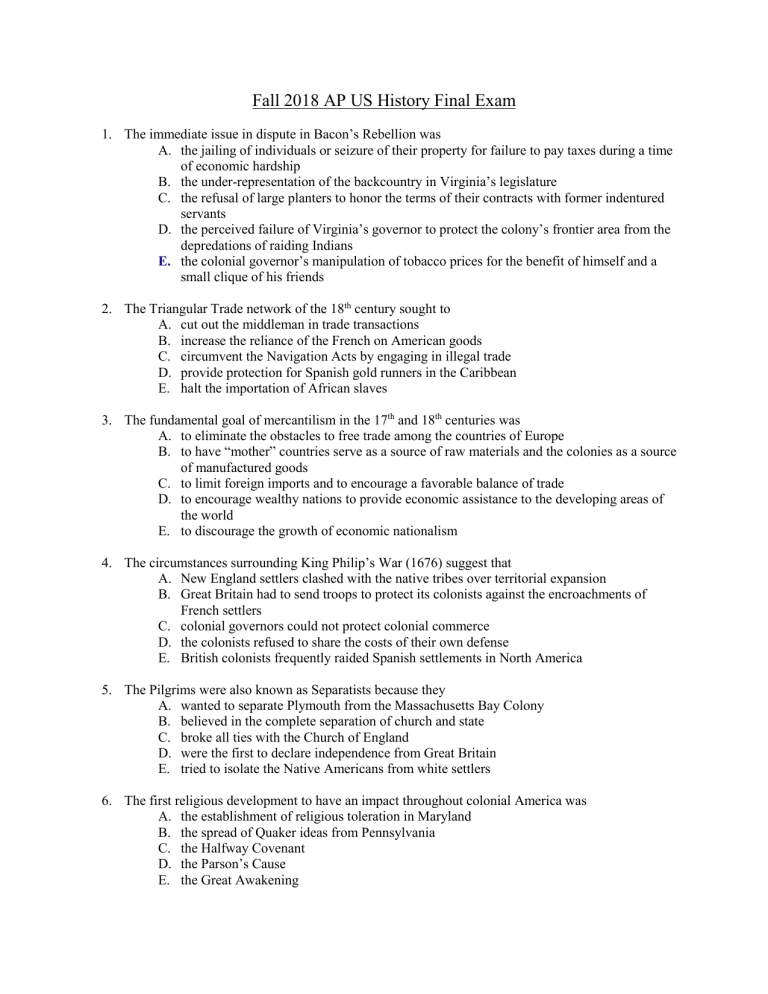
Fall 2018 AP US History Final Exam
1.
The immediate issue in dispute in Bacon’s Rebellion was
A.
the jailing of individuals or seizure of their property for failure to pay taxes during a time of economic hardship
B.
the under-representation of the backcountry in Virginia’s legislature
C.
the refusal of large planters to honor the terms of their contracts with former indentured servants
D.
the perceived failure of Virginia’s governor to protect the colony’s frontier area from the depredations of raiding Indians
E.
the colonial governor’s manipulation of tobacco prices for the benefit of himself and a small clique of his friends
2.
The Triangular Trade network of the 18 th century sought to
A.
cut out the middleman in trade transactions
B.
increase the reliance of the French on American goods
C.
circumvent the Navigation Acts by engaging in illegal trade
D.
provide protection for Spanish gold runners in the Caribbean
E.
halt the importation of African slaves
3.
The fundamental goal of mercantilism in the 17 th and 18 th centuries was
A.
to eliminate the obstacles to free trade among the countries of Europe
B.
to have “mother” countries serve as a source of raw materials and the colonies as a source of manufactured goods
C.
to limit foreign imports and to encourage a favorable balance of trade
D.
to encourage wealthy nations to provide economic assistance to the developing areas of the world
E.
to discourage the growth of economic nationalism
4.
The circumstances surrounding King Philip’s War (1676) suggest that
A.
New England settlers clashed with the native tribes over territorial expansion
B.
Great Britain had to send troops to protect its colonists against the encroachments of
French settlers
C.
colonial governors could not protect colonial commerce
D.
the colonists refused to share the costs of their own defense
E.
British colonists frequently raided Spanish settlements in North America
5.
The Pilgrims were also known as Separatists because they
A.
wanted to separate Plymouth from the Massachusetts Bay Colony
B.
believed in the complete separation of church and state
C.
broke all ties with the Church of England
D.
were the first to declare independence from Great Britain
E.
tried to isolate the Native Americans from white settlers
6.
The first religious development to have an impact throughout colonial America was
A.
the establishment of religious toleration in Maryland
B.
the spread of Quaker ideas from Pennsylvania
C.
the Halfway Covenant
D.
the Parson’s Cause
E.
the Great Awakening
7.
In the mid-18 th century, the first wave of non-English speaking immigrants (other than African slaves) arrived in the English colonies. They were ethnic
A.
Poles
B.
Scandanavians
C.
Germans
D.
Italians
E.
Russians
8.
New England’s tightly-knit colonial societies in the 17 th century began to experience trouble when
A.
indentured servants ended their contracts and demanded work
B.
many began to question the strict adherence to Calvinist doctrine
C.
Puritans intermarried with natives
D.
the birth rate among Puritan families began to drop
E.
Parliament revoked the Royal Charter in 1658
9.
“The wrath of God burns against them, their damnation does not slumber; the pit is prepared, the fire is made ready, the furnace is now hot, ready to receive them; the flames do now rage and glow.
The glittering sword is whet, and held over them, and the pit hath opened its mouth under them.”
--Jonathan Edwards, 1741
The quote above embodies the spirit of the Great Awakening in that
A.
the sermon attempts to emote feelings of angst among listeners
B.
traditional Calvinist teachings are being shared
C.
only the elite would hear such speeches
D.
predestination is valued above faith
E.
it shows emotion has no place in worship
10.
A major effect of the Stono Rebellion was
A.
an increase in the number of slaves brought into the southern colonies
B.
increased fortifications around several southern cities
C.
an attempt by slave owners to lessen the horrors of the “middle passage”
D.
the passage of legislation in southern assemblies calling for mandatory capital punishment for escaped slaves
E.
harsher treatment of slaves in many parts of the south
11.
In 1774, Parliament passed the Intolerable (Coercive) Acts, which were intended to
A.
force New York to obey the Quartering Act
B.
punish Massachusetts for the Boston Tea Party
C.
close the port of Philadelphia until John Hancock and Ben Franklin surrendered
D.
empower colonial governors to enforce the Stamp Act
E.
close all Eastern ports after Lexington and Concord
12.
In the 1840s, the Oregon Country's ownership remained in dispute between the United States and
A. Mexico
B. Russia
C. France
D. Great Britain
E. Canada
13.
The founder of the Mormon faith was
A. Brigham Young
B. John Humphrey Noyes
C. Joseph Smith
D. Robert Owen
E. David Walker
14.
The British government imposed the Townshend Acts on the American colonies in the belief that
A.
the American position regarding British taxation had changed
B.
it was necessary to provoke a military confrontation in order to teach the colonists a lesson
C.
its provisions were designed solely to enforce mercantilism
D.
it had been approved by the colonial legislatures
E.
the Americans would accept it as external rather than internal taxation
15.
Horace Mann was the chief leader in the movement for
A. public education
B. communal socialism
C. racial equality
D. prison reform
E. temperance
16.
The battles of Lexington and Concord were significant because
A.
they convinced the British that the colonists could not be defeated militarily and led to the British abandonment of the port of Boston
B.
they proved the superiority of European military tactics as well as the superiority of
British regulars to the ragtag American militias
C.
they marked the first organized battles between British regulars and colonial militiamen and ended any hopes for a peaceful resolution to the disagreement between England and its colonies
D.
they marked the turning point of the American Revolution. After Concord, the British were never again able to regain the offensive against the Americans
E.
they led to Benedict Arnold’s betrayal of the American cause when he felt he wasn’t given enough recognition for his role in leading the Americans to victory.
17.
Thomas Paine’s pamphlet
Common Sense introduced a new element into the debate with Britain by
A.
calling for complete independence of the colonies and attacking not only King George III but also the idea of monarchy
B.
emphasizing that both internal and external taxes could be levied on the colonies by the
Parliament in London
C.
rejecting John Locke’s contract theory of government
D.
arguing that taxation for the purpose of paying the government debt contracted during the
French and Indian War was acceptable
E.
suggesting that the colonies reconcile their differences with the government in London
18.
Harriet Beecher Stowe provided the most effective piece of abolitionist propaganda with her novel
A. Black Like Me
B. The Fire Next Time
C. Testimony of a Thousand Witnesses
D. American Slavery as It Is
E. Uncle Tom's Cabin
19.
The French formally recognized American independence and made an open treaty of alliance with the Americans as a result of the
A.
defection of Benedict Arnold to the British in 1780
B.
defeat of General Cornwallis at Cowpens and his turn northward
C.
increasing strength of the Tories in the Southern colonies
D.
defeat of the Hessians at Trenton
E.
surrender of Burgoyne and American victory at Saratoga
20.
Which of the following is a direct social change brought about by the American Revolution?
A.
The emancipation of slaves who fought against the British
B.
The elimination of property qualifications for voting
C.
An end to religious requirements for holding political office
D.
Recognition of the right of women to inherit property
E.
Complete separation of church and state
21.
The Federalist papers challenged the conventional political wisdom of the 18 th century when they asserted that
A.
a republican form of government could succeed only in small countries
B.
limitations on the popular will lead to tyranny
C.
a weak central government was the only guarantee of individual rights
D.
a large republic offered the best protection of minority rights
E.
political parties were crucial to the success of the new government
22.
Which of the following was NOT true of the Northwest Ordinance of 1787?
A.
It recognized the territorial claims of the various Indian tribes within the Northwest
Territory.
B.
It guaranteed freedom of religion to settlers in the Northwest Territory.
C.
It guaranteed the right to a jury trial to settlers in the Northwest Territory.
D.
It prohibited slavery within the Northwest Territory.
E.
It specified procedures through which settlers could organize state governments and eventually apply for full statehood.
23.
The first successfully marketed colonial crop from the English colonies in North America was
A. cotton
B. indigo
C. rice
D. sugar
E. tobacco
24.
For James, the Duke of York, to take possession of the colony granted to him by his brother,
Charles II, he had to use military force against
A. the Iroquois
B. the Dutch
C. the Spaniards
D. the French
E. the Massachusetts Bay colony
25.
Which treaty does the map above refer to?
A.
Treaty of Guadalupe Hidalgo
B.
Treaty of Paris of 1763
C.
Treaty of Paris of 1783
D.
Pinckney’s Treaty
E.
French Treaty of 1755
26.
The Republican response to the 1798 Alien and Sedition Acts included
A.
South Carolina’s nullification of the acts
B.
the Virginia and Kentucky Resolutions
C.
the Hartford Convention
D.
the Ostend Manifesto
E.
the Mulligan Letters
27.
The international incident known as the XYZ Affair involved
A.
a French foreign minister’s demand for a bribe before he would meet with American envoys.
B.
the British refusal to evacuate their forts on American territory.
C.
General Andrew Jackson’s incursion into Spanish-held Florida.
D.
the British seizure of American crewmen from a U.S. Navy warship in Chesapeake Bay.
E.
Aaron Burr’s secret plot to detach the western United States in order to create a new nation of which he would be ruler.
28.
The XYZ Affair was important in that it
A.
underlined the importance of a strong, impartial federal judiciary in resolving
Constitutional disputes between the state and federal governments.
B.
led to U.S. abrogation of the 1778 peace treaty and brought the U.S. into a quasi-war with
France.
C.
nearly brought Britain into the Civil War on the side of the Confederacy
D.
discredited Aaron Burr and forced his removal from the 1880 presidential election ticket as Thomas Jefferson’s running mate.
E.
led the U.S. to seek a declaration of war against Britain in 1812 for impressing American seamen onto British ships.
29.
In 1781, the states ratified a plan for a decentralized national government of the United States that was called the
A. United States Constitution
B. Articles of Confederation
C. Declaration of Confederation
D. Confederate States Constitution
E. Declaration of Independence
30.
George Washington responded to the Whiskey Rebellion in the western counties of Pennsylvania by
A.
ignoring it until it died out
B.
dispatching Alexander Hamilton, Secretary of the Treasury, to negotiate a reduced tax with the protesters
C.
calling a special session of Congress to deal with the problem
D.
sending an army larger than any he had ever commanded in the Revolution to put down the revolt
E.
requesting an advisory opinion from the Supreme Court on the constitutionality of the excise tax
31.
The Bill of Rights
A.
is the first ten amendments to the Constitution
B.
limited the powers of the federal government to those specifically named in the
Constitution
C.
gave citizens freedom of religion, assembly, speech and press, and the right of petition
D.
guaranteed the rights of persons accused of crime
E.
All of the above
32.
All of the following are reasons why America entered the War of 1812 EXCEPT
A.
the impressment of American naval crews
B.
the existence of a strong American navy ready to demonstrate its capabilities
C.
the relationship between the British and Native American tribes in the western territories of North America
D.
the violation of American’s rights as a neutral power
E.
the desire by American leaders to acquire additional western territories
33.
During the final phase of the American Revolution, General Cornwallis was surrounded and forced to surrender his entire force at
A. Charleston, South Carolina
B. Yorktown, Virginia
C. Wilmington, North Carolina
D. Savannah, Georgia
E. Cowpens, South Carolina
34.
The greatest significance of the Supreme Court’s decision in
Marbury v. Madison was that it
A.
claimed for the first time that the Supreme Court could issue directives to the president
B.
claimed that the Supreme Court alone was empowered to say what the Constitution meant
C.
claimed for the first time that the Supreme Court could declare an act of Congress unconstitutional
D.
was openly defied by President Thomas Jefferson
E.
resulted in a major realignment of the first American party system
35.
Alexander Hamilton's programs and influence led to the creation of an opposition group known as the
A. Federalist party
B. Democratic-Republican party
C. Liberty party
D. Whig party
E. Antifederalist party
36.
The Louisiana Purchase resulted primarily from
A.
efforts to prevent Spain from closing off westward expansion by the United States
B.
glowing reports of the vast beauty and potential of the region as reported by Lewis and
Clark on their return from their famous exploration of the region
C.
American efforts to prevent a war with France over control of the Louisiana Territory and secure American commerce rights in New Orleans and along the Mississippi River
D.
Federalist desires to establish a strong confederation of antislavery states west of the
Mississippi River and further limit the power of the Southern Republicans
E.
Republican desires to further dilute the Federalist power base in New England by expanding the country and reducing Federalist influence
37.
The canal building period of the 1820s resulted primarily from
A.
the need for a more effective public transportation system between major Northeastern cities and towns
B.
speculators trying to find a quick and cheap method of moving European immigrants to unexplored frontiers in the West
C.
the need to move U.S. naval forces quickly from the Atlantic to the Great Lakes and the
Mississippi River
D.
a shortage of usable fresh water in the trans-Appalachian states
E.
the need for an economic method of shipping farm goods from the Western states and territories directly to Eastern markets
38.
The first textile workers in America were primarily
A.
farmers’ daughters from New England
B.
freed slaves who moved North from the respective labor markets in the South
C.
Irish immigrants
D.
ex-soldiers and war veterans who often could find work nowhere else
E.
uneducated males from the working class who comprised America’s first generation of
“blue collar” workers
39.
The completion of the Erie Canal in 1825 resulted in all of the following EXCEPT
A.
increased profitableness of farming in the Old Northwest
B.
encouraging the emigration of European immigrants and New England farmers to the Old
Northwest
C.
forcing many New Englanders either to abandon their farms or to switch to dairy, fruit, and vegetable farming
D.
a weakened political alliance between the farmers of the Old Northwest and the planters of the South
E.
strengthening the dependency of farmers in the Old Northwest on the Mississippi River system for access to markets
40.
The Indian Removal Act of 1830 which sought to continue the Jeffersonian policies toward the
Eastern tribes
A.
was vetoed by Andrew Jackson
B.
proposed moving the Eastern tribes to the trans-Mississippi West
C.
conferred citizenship and the franchise on Indian adult male property owners
D.
did not apply to either the Cherokees or the Seminoles
E.
declared the Eastern tribal lands to be independent nations
41.
Identify the following: “…the American continents… are henceforth not to be considered as subjects for future colonization by any European powers…” and the “policy [of the United States] in regard to Europe… is not to interfere in the internal concerns of any of its powers…”
A.
Washington’s “Farewell Address”
B.
Preamble to treaty with France for the purchase of Louisiana
C.
Monroe Doctrine
D.
Washington’s “Proclamation of Neutrality”
E.
Treaty of Ghent ending the War of 1812
42.
All of the following were effects of the invention of the cotton gin except
A. a strengthening of the textile industry in the South
B. a decrease in the use of slave labor in the Deep South
C. an increase in industrialism in the North
D. a transformation of economic life in the South
E. an increase in the export of cotton from the United States
43.
The city that gained the most from the success of the Erie Canal was
A. New York
B. Philadelphia
C. Baltimore
D. Albany
E. Buffalo
44.
The immediate effect of Andrew Jackson’s attack on the Second Bank of the United States in 1834 was
A.
the creation of the “independent treasury”
B.
an expansion of credit and speculation
C.
the failure of state banks
D.
the establishment of modern banking regulations
E.
the creation of a federal deficit
45.
“Let Southern oppressors tremble…I shall strenuously contend for immediate enfranchisement….I will be as harsh as truth and as uncompromising as justice.”
The author of the statement above was
A.
John C. Calhoun
B.
Stephen A. Douglas
C.
Henry Clay
D.
Abraham Lincoln
E.
William L. Garrison
46.
An important consequence of the “tariff of abominations” (1828) is that it led to the
A.
taxation of consumer items
B.
reelection of Andrew Jackson
C.
invoking of the doctrine of nullification
D.
alliance of Southern planters and Western farmers
E.
expansion of the New England textile industry
47.
Which of the following best characterizes the response of Great Britain and France to the American
Civil War?
A.
They saw advantages in a divided Union, but pursued cautious policies towards both sides.
B.
They favored restoration of the Union and actively worked to arbitrate the conflict.
C.
They favored permanent separation of the Union and openly supported the South.
D.
They favored restoration of the Union and openly supported the North.
E.
They had no interest in the conflict and remained aloof from it.
48.
In part, President Lincoln refrained from taking action to emancipate slaves until the Civil War had been in progress for almost two years because
A.
he sought to retain the loyalty of the border states.
B.
slavery still existed in most Northern states.
C.
Congress had not granted him the authority.
D.
he was preparing a plan to send all of the slaves to Liberia.
E.
he feared a hostile reaction on the part of the British and French.
49.
The North’s advantages over the South at the outbreak of the Civil War included all of the following EXCEPT
A.
greater agreement over war aims.
B.
more substantial industrial resources.
C.
a more extensive railroad network.
D.
dominance in foreign trade.
E.
naval supremacy.
50.
On April 9, 1865, Robert E. Lee surrendered the Army of Northern Virginia to Ulysses S. Grant at
A. Washington, D.C.
B. Richmond
C. Appomattox Courthouse
D. Durham, North Carolina
E. Petersburg, Virginia
51.
The Battle of Gettysburg was critical in that
A.
General Lee was captured.
B.
the Confederates would never again have a victory.
C.
Ulysses S. Grant was able to take control of the Mississippi River
D.
the Confederates successfully crossed the Potomac River.
E.
the port of New Orleans was closed to trade.
52.
The sharecropping system in the South following Reconstruction had the effect of
A.
allowing many former slaves and poor white tenant farmers, who could have never otherwise owned land, to buy their own farms.
B.
moving many former slaves and poor white tenant farmers into the middle class.
C.
pushing tenant farmers and poor independent farmers into deep levels of debt to large landowner and merchants.
D.
helping to limit the power of former plantation owners and Northern business interests.
E.
changing the basic attitudes of whites and blacks who were now forced to work side-byside farming the same land.
53.
After the collapse of the Reconstruction governments, the men who came to power in the “New
South” were called
A.
carpetbaggers
B.
Scalawags
C.
copperheads
D.
freedmen
E.
redeemers
54.
The Amendment to the Constitution that ended the practice of slavery throughout the United States was the
A. Twelfth
B. Thirteenth
C. Fourteenth
D. Fifteenth
E. Sixteenth
55.
Andrew Johnson was impeached primarily because:
A.
he was an alcoholic and made several major speeches while totally drunk
B.
angry Northern Congressman resented the fact that Johnson, a Southerner (from
Tennessee), had become president following Lincoln’s death and was administering
Southern Reconstruction.
C.
members of Congress felt that Johnson’s Reconstruction policies were too harsh and unfairly penalized former Confederate leaders trying to rebuild their homeland.
D.
he demanded suffrage for blacks in addition to the abolition of slavery.
E.
he obstructed the enforcement of congressional Reconstruction policies that he felt were too harsh.
56.
Republican Reconstruction governments were supported by all of the following groups except
A. scalawags
B. redeemers
C. freedmen
D. carpetbaggers
E. Southern African-Americans
57.
Which of the following statements is true of the Wade-Davis Bill?
A.
It allowed restoration of a loyal government when as few as ten percent of a state’s prewar registered voters swore future loyalty to the Union and acceptance of emancipation.
B.
It explicitly required that the vote be accorded to the recently freed slaves.
C.
It allowed high-ranking rebel officials to regain the right to vote and hold office by simply promising future good behavior.
D.
It was pocket-vetoed by Lincoln
E.
It provided substantially more lenient terms of reconstruction than those favored by
Lincoln
58.
President Lincoln's plan for Reconstruction can best be described as
A. mild
B. harsh
C. poorly planned
D. popular with Radical Republicans
E. radical
59.
The Wilmot Proviso that prohibited slavery in any territory acquired from Mexico
A.was quickly passed by Congress
B.never came to a vote in Congress
C. received the support of President Polk
D. passed the Senate but lost in the House
E. passed the House but lost in the Senate
60.
Despite earlier efforts to settle the issue, the slavery question became a major issue in the 1840s and
1850s because the
A. U.S. Supreme Court had a Northern majority
B. nation was expanding to the West
C. presidents of the era were all from the North
D. evangelists of the Second Awakening raised the issue frequently
E. existing political parties needed an issue that would unite their members
61.
The provisions of the Compromise of 1850 included
A. abolishing fugitive slave laws
B. admitting California as a slave state
C. prohibiting slavery in New Mexico territory
D. abolishing the slave trade in the District of Columbia
E. ending slavery in all new territories
62.
In the 1857 case of Dred Scott v. Sanford, the Supreme Court ruled that
A. Congress had no authority to exclude slavery from the federal territories
B. former slaves could gain freedom if their owners voluntarily took them into free states or territories
C. Dred Scott was entitled to freedom on a technicality, but his case was unique
D. escaped slaves could apply for freedom as free persons if they evaded capture for ten years or more
E. proslavery forces in Kansas had acted unconstitutionally
63.
During the election of 1860, the Democratic party
A. dissolved
B. lost most of the elections for senators and representatives
C. split into a Northern and a Southern faction
D. managed to draw what was left of the Whig party into its ranks
E. dominated voting strength in the Northeast
64.
President Lincoln responded to opposition to the war effort by
A. ordering suspension of all liberties in a few extreme cases
B. upholding the Bill of Rights in all cases
C. prohibiting election activities of the opposition party
D. engaging in widespread suspension of civil liberties
E. banning the Democratic party
65.
Sea power played an especially important role in the Civil War in the form of the
A. Confederate raids on Northern shipping
B. Union blockade of the Confederate coast
C. transportation of rebel troops and supplies on steamboats
D. ironclad ships that appeared during the war
E. Confederates’ ability to control all Southern ports
66.
The proposal for popular sovereignty called for deciding the issue of slavery in the territories through
A.Constitutional amendment
B.direct national referendum
C.a vote in both houses of Congress
D.executive order
E.a popular vote by the residents of each territory
67.
The most outrageous component of the Compromise of 1850 in the North was the
A. opening of New Mexico and Utah territories to slavery under popular sovereignty.
B. reduction of Texas to its present boundaries.
C. admission of California as a free state.
D. prohibition of slavery in the District of Columbia.
E. enactment of the new Fugitive Slave Law.
68.
The Republican Party platform in 1860
A. attempted to broaden the party's appeal in the North.
B. ignored the issue of slavery.
C. presented a moderate position on slavery.
D. dealt exclusively with slavery.
E. attempted to broaden the party's appeal in the South.
69.
A smaller conflict, which prefigured the American Civil War, was fought in which state during the late 1850s?
A) Kansas
B) Texas
C) Tennessee
D) Missouri
E) South Carolina
70.
Almost all of the supporters of Manifest Destiny agreed that
A. Americans had a God-given right to expand their superior civilization into new territory
B. the "empire of liberty" should extend into Canada and Mexico
C. the United States could use force to achieve this expansion
D. expansion should serve the economic interests of Americans
E. the United States should annex large sections of Mexico
71.
The main issue in James K. Polk's 1844 presidential campaign was his commitment to
A. increasing the tariff
B. territorial expansion of the United States
C. reducing the cost of Western land
D. rechartering the Bank of the United States
E. resolving sectional differences
72.
The Treaty of Guadalupe Hidalgo included all the following provisions except
A. Mexico ceding New Mexico to the United States
B. Mexico acknowledging the Rio Grande as the border
C. the United States agreeing to pay Mexico $15 million
D. the United States retaining transit rights across Mexico
E. Mexico ceding California to the United States
73.
"Bleeding Kansas" gained its reputation for violence because of the
A. U.S. Army's vicious tactics while driving the Indians out of the territory
B. general lawlessness of cowtowns like Dodge City and Abilene
C. actions of various bandit gangs that roamed the territory before the arrival of federal marshals
D. sporadic warfare between settlers on opposing sides in the battle over the slavery issue
E. fierce Indian raids on new settlements of whites
74.
John Brown's raid on Harper's Ferry
A. increased Southern fears of Northern hostility
B. was praised by most Northerners
C. had little effect on sectional tensions
D. was intended as a statement against the U.S. government
E. resulted in the resignation of James Buchanan
75.
What two issues lay at the heart of Reconstruction?:
A. whether the federal or state government was ultimately sovereign, and whether Africa-
Americans or Native Americans were the most oppressed minority group.
B. which party would gain the ascendance, and how the government could regulate the economy.
C. the future of political and economic power for freed slaves, and the future of North-South economic and political relations.
D. rebuilding the North's shattered economy and restoring the South's shattered society
E. the future of the Radical Republican Congress and the impeachment of Andrew Johnson
76.
The Fourteenth Amendment to the Constitution was important because it?:
A. prohibited slavery within the United States.
B. guaranteed equal protection under the law for every American citizen.
C. prohibited any state from denying an American citizen the right to vote based on race/ethnic background, color, or having previously been a slave.
D. provided Congress with the power to establish and collect income taxes.
E. prohibited any state from denying women the right to vote.
77.
What brought the Radical and moderate Republicans together in an alliance against President
Johnson?:
A. the president's vetoes of the Freedmen's Bureau bill and the Civil Rights Act of 1866.
B. realization by congressional Republicans that Johnson was delaying readmission of the former Confederate states.
C. the president's proposal for an agency that would provide relief, rations, and medical care for impoverished southerners.
D. a desire to send a message to northern Democrats that they could work together to rebuild the South.
E. the passage of the thirteenth amendment and its veto by Johnson
78.
The purpose of the Freedman's Bureau was to?:
A. gain the vote for the freed slave.
B. provide 40 acres and a mule for each slave without further assistance.
C. get radical Republicans in positions of power in the South.
D. feed, adjust, and educate the former slaves, thus aiding their adjustment to freedom.
E. work against the Black Codes.
79.
The "Compromise of 1877" did which of the following?:
A. secured political rights for the freedmen.
B. granted political amnesty to former Confederate leaders.
C. ended federal military support of Republican administrations in the South.
D. provided for a new method of counting the presidential electoral vote.
E. restored the Southern states to the Union.
80.
A derogatory term applied to Northerners who settled in the South after the Civil War is:
A. Scalawags
B. Sharecroppers
C. Tenant farmers
D. Jim Crow
E. Carpetbaggers
